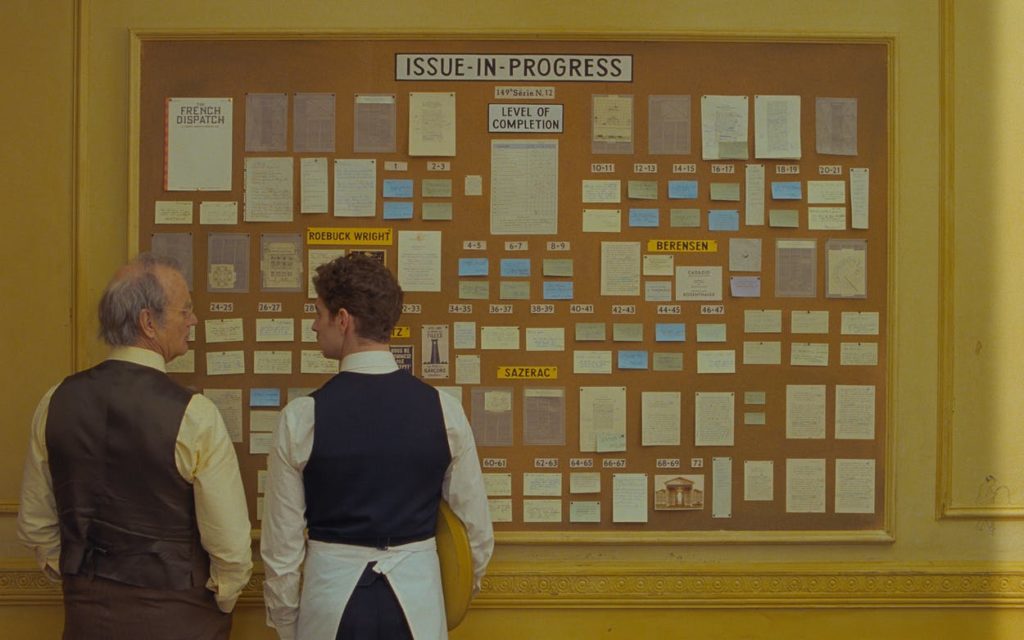
| USA-France, 2021 | Comedy/Post-modern | Author Work | Trailer |
Wes Anderson. Everybody has, at least, heard this name before. Eventhough some may not have watched any of his works, it’s undoubtely clear that everybody with a bit of cultural interest has a fixed image of his usual style. Not being this enough reason to be interested to watch his new product -if curiosity can be considered a valid reason for it-, the trailer of The French Dispatch showed an extravaganza of filmic post-modernity that got me instantly hooked. I needed this shit in my life as much as Maywater, as we say in Spanish.
The movie presents a pack of deliciously stereotypical misfit journalists that, somehow, raise a weekly cultural supplement of a good-for-nothing Kansas newspaper called The French Dispatch -oddly offering information about the European cultural scene to the Midwest- from a pamphlet to a monstrum of literary quality. This is achieved by the efforts of its director, played by Bill Murray, in involving the sharpest expat journalism prodigies in his editorial. Each one is an expert in reporting different kinds of topics: Editorial comment (Anjelica Huston), Travels (Owen Wilson), Arts (Tilda Swinton), Politics (Frances McDormand), Cuisine (Jeffrey Wright) and Obituary (all). Nevertheless, the publication reaches its end with the death of its leader, therefore resulting in the release of one last glorious issue, which is showed in the movie.
Therefore, The French Dispatch is divided in separate segments that correspond to the different sections of the publication, which are narrated/performed by every journalist and showing in featurettes the chronicle which is told in their alleged text. Whilst the segments belong to the same corpus and universe, they can be seen as independent stories with different characteristics and focus. However, in each one of them, Wes Anderson goes full gas. The amount of post-modern craze, hasty rhythm and quick, awkward but hilariously intelligent one-liners per minute is god-tier in this film. Combine this with a strange and indefinite time period that melanges anything European 1940s-1970s aesthetic, sudden changes of camera quality or colour space, mutable scenarios, absolutely intrincate storytelling schemes and animations and glorious cameos by unlikely actors. I cannot simply grasp the budget of shooting this movie, but it’s worth every single cent. I can perfectly imagine Wes Anderson conceiving this movie after having drunk a bottle of absinth in any French hotel and daring himself to be the most post-modern in his career with this work, and fucking succeeding.
Incidentally, each of these reports/segments shows a soft satyrical aspect. Whilst exaggerating how art, politics, haute cuisine and the like were perceived between the 40s and the 70s, the hilarious stories found within also criticise how these pretentious topics are dealt with today. Contemporary art is inflated by businessmen out of humble and absurd incidents, from the times of Kahnweiler to today’s Damien Hirst. Political revolutions that start with simple reasons become a total chaos of stupid disparities, but Jean-Luc Godard tried to take them so seriously in the 1960s that he became utterly ridiculous. And when going to try high kitchen the act of nourrishing oneself becomes the less important thing of the experience.
The French Dispatch is able to sustain a wonderful balance between time and space and offers us a brilliant comedy with a multi-temporal message relating culture and pretentiousness. Of course, it’s most probable that Wes Anderson is one hell of a cultural connoiseur, so ultimatively one can say that this movie is the ultimate self-criticism, whilst trying to squeeze all power of his filmmaking skills.
This is to applaud the director and his team, because anybody able to relativise themselves and laugh at what makes them who they are deserves all possible respect. And furthermore, the movie is damn fine too. Just, perhaps too over-the-top for some audiences unfamiliar with supposed high-culture scenes. But hey, with no pain there is no (cultural) gain.